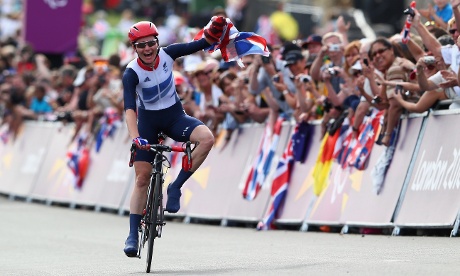
The greatest British Paralympic athlete of our time, Sarah Storey – or Dame Sarah Storey, as she has been since New Year – is due to give birth in June, but she is not giving up cycling.“I already train for only 12-18 hours a week, so I’m not cutting back on workouts for now.”” – she says.
By lifting the handlebars and keeping her knees away from her stomach, she can continue riding and enjoy it. As Sarah explains:”
“So far everything is going great, and I am cautiously waiting for the moment when I decide that I should no longer continue. Maybe this will happen tomorrow or the day after tomorrow, so I am not making any specific plans for the future.”
She admits that she would happily ride until childbirth, and then“Together with the child, as soon as it is possible.”Story’s Paralympic career began in 1992 in Barcelona, where she was involved in swimming. After a chronic ear infection, she switched to cycling in 2005. She says that women show a special interest in sports and are increasingly participating in races and competitions.
She hopes that this trend will also affect those who prefer a more relaxed pace.
“I started riding a bicycle simply to stay in shape, then to get to the swimming pool, and when it came to changing sports, I was already guided by the fact that I had fallen in love with bicycles.”
Despite her obvious passion, Sarah realistically looks at the obstacles that arise for those who are first venturing out on the road. But she adds:
“After obtaining the initial information, people should understand that many of their initial fears will not materialize, because the actual experience of driving on the road is completely different.”
Many commutes to work do not exceed five miles – a distance that is easy to overcome, but the benefits for fitness and health will be immediately noticeable.
Stori considers a helmet an essential item.“When I don’t wear it, it feels like I forgot my hand at home.”But she adds that everyone has their own opinion on this matter and adults will be able to make their own decision.
Getting people to bike to work is an exciting prospect for Sarah, but what she really wants to achieve is the popularization of sports in schools.
“The skills that will be useful to you on a bicycle cannot be obtained simply by riding it. More physical exercises need to be introduced into the curriculum, not just cycling and swimming – when I was younger, we did music of movements, something like body awareness. Many athletes who did this in childhood easily transition from one sport to another.”
“Difficulties with balance and the proximity of other vehicles on the road can quickly discourage beginners. Story says:”
“It is obvious that it is always important to pay attention to where your hands and feet are. We must ensure that there is a sufficient foundation in school for people to always have the necessary knowledge and understanding of everything related to sports during physical activity. School plays the biggest role in this.”
For beginners and those who have not yet fully mastered cycling, Stori advises riding with friends, choosing routes carefully, and focusing on enjoying the ride.
Those who regularly commute to work and participate in races in their free time can also benefit from this:
“Every minute in the saddle is a minute of skill growth. People who ride frequently perceive it as part of their training – some practice their sprints only on the way to work, thanks to numerous traffic lights. Here, unconventional thinking plays a role, and many race between traffic lights, creating a semblance of interval training.”
Did Sarah observe such a competitive spirit on the roads of the capital? She answers with a smile:
“No, not in London, it happened in Majorca, where I was training last month. I can’t speed up because I’m pregnant and have to monitor my heart rate, but the sprinters who pass me eventually slow down and are surprised why I gradually catch up with them. Sometimes people pass you just because you’re in the ‘GB Jersey’ shape, as it’s a great excuse to show off at the pub.”
 info@velo.bike
info@velo.bike